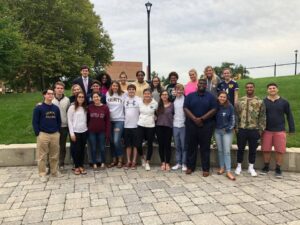Kip Lynch ’22
News Editor
The Trinity Tripod is examining all facets of study abroad safety in a new investigative, news analysis series. Over a series of forthcoming articles, the Tripod will dive into the issue through the administrative, faculty, student, and legal lenses, and consider issues of reporting, accuracy, and statistical analysis under the Clery Act.
Managing Editor Daniel Nesbitt ’22 examined last year the limited scope of the Jeanne Clery Disclosure of Campus Security Policy and Campus Crime Statistics Act (Clery Act) and noted that this resulted in less than transparent crime statistics about study abroad institutions.
Nesbitt referenced a particular incident unreported under the Clery Act in February 2018 when “the Tripod reported that three Trinity students abroad in Barcelona were mugged in early January of the same year.” Importantly, Trinity’s ASR [annual security report] stated that the Office of Study Away reported zero incidents of any crime category that year.
When asked about this discrepancy in March 2020, Heavren clarified that “in this case, there was a Clery reportable crime, but it did not occur in the Clery geography, thus it was not included in the full report.”
The Tripod examined Trinity’s safety measures in place at the administrative level and their efficacy in light of possible gaps in reporting permitted under the Act.
As one measure of security, study abroad programs at Trinity must be approved by both the Office of Study Away and the College’s faculty Curriculum Committee.
According to the Faculty Manual, the Curriculum Committee, which includes faculty representatives as well as representatives of the administration and students, is responsible for “the approval, and periodic review, for study away programs and offerings. To fulfill this responsibility, the Curriculum Committee reviews any newly proposed study away programs and associated materials, often including individual course syllabi.” The Dean of the Faculty also sits as a voting member of the Committee.
The Tripod spoke to Associate Dean for Curriculum and Associate Professor of Theatre and Dance Mitchell Polin about the process for approving programs by the Curriculum Committee.
Discussing reasons why a program may be rejected, he stated that “the Committee will often seek advice from associated Departments and Programs whose areas are represented in the study away program. The Committee members need to make certain that any credits earned are equivalent to a credit earned through the completion of a course on our home campus. In past academic years, programs have been rejected for not meeting the criteria of the college.” Programs are then typically reviewed annually by the Office of Study Away, which submits its recommendations to the Curriculum Committee.
On whether the faculty have raised questions of concern relative to program safety, Polin stated that “The Office of Study Away has not received questions or concerns, in recent years, regarding program safety. However, safety reports are available from the Office of Study Away upon request.”
The Tripod spoke with Director of the Office of Study Away Jennifer Summerhays about Trinity’s security protocols despite the reporting discrepancies, who indicated that Trinity “regularly consults with the Overseas Security Advisory Council (OSAC), the U.S. State Department, and similar governing bodies in Australia, the UK, and Canada for a well-rounded, nuanced perspective on global health and safety.” Summerhays also cited Trinity’s partnership with International SOS (ISOS) and Lodestone as one way to “evaluate in a nuanced way, the safety of a destination at any given point in time.”
While Summerhays declined to provide copies of sample safety reports for institutions that faculty governance representatives could request, she did add that if emergencies occur, Trinity acts to “ensure the safety of our students, staff, and faculty abroad.” Further, she contended that Trinity “is happy to provide a safety and/or security update on any given program or location.” It was not immediately clear what form a safety and/or security update would take.
In the event of an incident, a “safety incident report is filed and then kept by the OSA,” Summerhays noted. While Trinity “in compliance with U.S. federal law,” reports “to campus safety for Clery reporting” any incidents, the limitations of Clery geography—as the Tripod has previously reported—permits the College to not report selected incidents that occur at international programs.
Trinity College is not alone both in the popularity of study abroad programs as well as discrepancies that can arise in reported crime statistics and events that occur while students participate in programs. In a 2017 article on study abroad programs at Cal State Fullerton, Brandon Pho noted the university “has seen a nearly 100 percent participation increase in a study abroad program that is lacking in safety records.” An internal audit by CSU System’s Office of Audit and Advisory Services found numerous weaknesses, including the “lack of a documented process for selecting third party-providers of study abroad programs.” Trinity, however, does appear to have some documented process.
Summerhays also pointed to the requirement that “all U.S. citizens must register with the STEP [Smart Traveler Enrollment Program]” prior to departure, together with Trinity’s memberships in “OSAC, NAFSA, and FORUM” as permitting Trinity to remain up-to-date via “professional forums and regular conversations with peer institutions regarding global safety and health concerns as they relate to study away.” International students, however, are encouraged but not required to register with STEP.
The non-profit Protect Students Abroad, founded by Elizabeth Brenner and Ros Thackurdeen in 2012, has sought to address gaps in program safety. Brenner and Thackurdeen have identified that at “campus-hosted study abroad forums, the goal of programs is to recruit students. Thus, program materials have the flavor of marketing, with beautiful photos and captions that promise a life changing experience. Because there are no transparency requirements of the study abroad industry, it can be difficult for parents and students to find both neutral and comprehensive information about student safety.”
Importantly, note Brenner and Thackurdeen, study abroad programs and providers “have no obligation to disclose safety information, and we are aware of programs that have not answered safety questions truthfully.”
A version of this article appeared in the Tuesday, September 8, 2020 print edition of the Tripod on page 3.






+ There are no comments
Add yours